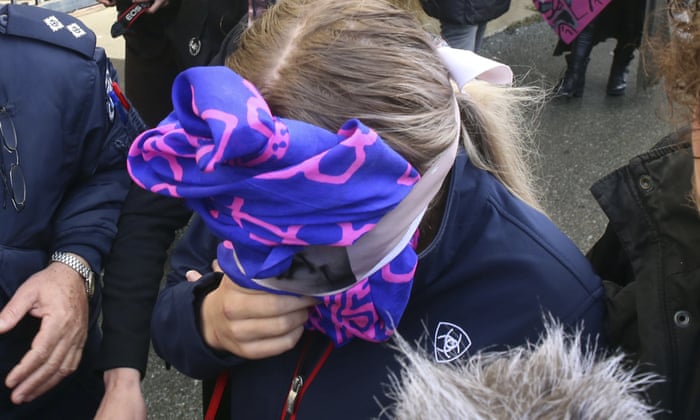A Brief Colonial History Of Ceylon(SriLanka)
Sri Lanka: One Island Two Nations
A Brief Colonial History Of Ceylon(SriLanka)
Sri Lanka: One Island Two Nations
(Full Story)
Search This Blog
Back to 500BC.
==========================
Thiranjala Weerasinghe sj.- One Island Two Nations
?????????????????????????????????????????????????Wednesday, January 1, 2020
Cypriot court 'failed to take British teenager's PTSD into account'
Psychologist says woman was suffering from condition when she retracted claim of gang-rape to police The 19-year old British woman leaving court after her trial in Paralimni, Cyprus, on Monday. Photograph: Philippos Christou/AP
The 19-year old British woman leaving court after her trial in Paralimni, Cyprus, on Monday. Photograph: Philippos Christou/APJosh Halliday and Peter Beaumont-
 A
British teenager found guilty by a Cypriot court of lying about being
gang-raped was suffering from severe post-traumatic stress disorder when
she retracted her claims, but that was not fully taken into account
during the trial, her psychologist has told the Guardian.
A
British teenager found guilty by a Cypriot court of lying about being
gang-raped was suffering from severe post-traumatic stress disorder when
she retracted her claims, but that was not fully taken into account
during the trial, her psychologist has told the Guardian.Dr Christine Tizzard, a chartered consultant psychologist who extensively assessed the woman for the defence, also said the 19-year-old now needs urgent therapy to avoid “life-changing” damage.
The student was ruled by a judge in Cyprus to have wilfully indulged in public mischief by claiming she was raped by a group of Israeli males while on holiday in Ayia Napa in July.
The foreign secretary, Dominic Raab, has promised to raise the “deeply distressing” case with the Cypriot authorities and contact has been made between officials from the two countries. Earlier, the Foreign Office said it was “seriously concerned” about the fairness of the trial.
The case against the Briton hinged on a statement retracting her original accusation, signed after hours of questioning by detectives in a police station that was neither recorded nor attended by a lawyer. She said in court that the police had forced her to change her story, telling the judge she was “scared for my life”.
Tizzard told the Guardian: “The salient point is that she was diagnosed with PTSD. That’s a standalone diagnosis. It’s a valid diagnosis and it hasn’t really been fully represented. Aside the fact it hasn’t been fully represented, it means she’s been unable to get the treatment she so sorely needs and every day she’s not having treatment the worse it gets.”
The psychologist, who gave evidence to one of the complainant’s court hearings in Cyprus in November, said the teenager should be commended for how she had held up under the strain but that her mental state had worsened in recent months. “I’m concerned that she needs robust and adequate therapy and very, very quickly or there’s a real concern that this is going to be life-changing and remain that way,” she said.
The government of Cyprus on Tuesday defended its police and judicial system amid growing concern about the fairness of her trial.
The woman, who has already spent more than a month in Nicosia general prison and has been prevented from leaving Cyprus since July, will be sentenced next Tuesday and faces up to a year in prison and a £1,500 fine. Her defence team has said it will appeal against the verdict all the way to the European court of human rights if necessary.
The ruling by Michalis Papathanasiou, at Famagusta’s district court in Paralimni, was strongly condemned by the woman’s lawyers, who claimed the trial was full of legal irregularities, and sparked a backlash against an island reliant on international tourism.
Dr Tizzard, who first assessed the woman in September and most recently about four weeks ago, said it was clear the complainant was suffering from PTSD at the time she retracted her claims to police, following seven hours of questioning without a lawyer or interpreter.
“It was clear, and has been clear all along, that she’s suffering from severe, and I do mean severe, PTSD. She’s in a dreadful state – we’ve been worried about her for several months and how she has deteriorated,” she said.
Dr Tizzard said people suffering from PTSD present differently at different times and become overwhelmed by difficult situations, causing them to react in unexpected ways.
She said: “They will very frequently feel such terror and discomfort and they will quite literally go along with anything to get out of a situation that they find overwhelming.
“My experience certainly of the teenager was, when talking to her, that she could change quite quickly, particularly if she was triggered by something that resembled the original trauma.”
There was growing domestic concern about the case in Cyprus on Tuesday. An editorial column in the English language newspaper Cyprus Mail said the case was a “PR disaster” for the island’s police force and had made them “look like Keystone Cops to the rest of the world”.
The leader column strongly criticised the Cypriot justice system, which does not require police interviews to be recorded. It said: “It’s impossible to believe that at the start of the year 2020, our police, who no doubt have every sort of state-of-the-art technology to hand, do not record interviews with suspects, while almost every call to a public utility and businesses is recorded these days.”
Despite the announcement of the verdict, reaction in Israel to the case was extremely muted. While Israeli media published short stories on the verdict and on the Foreign Office’s reaction, there was no comment from the youths who were initially arrested or from their families.
The group, largely teenagers, reportedly included the son of a former Israeli political figure, with several of the youths resident in a settlement on the outskirts of Jerusalem. An Israeli lawyer, who represented some of the group, and who was contacted by the Guardian, was also not available for comment.
